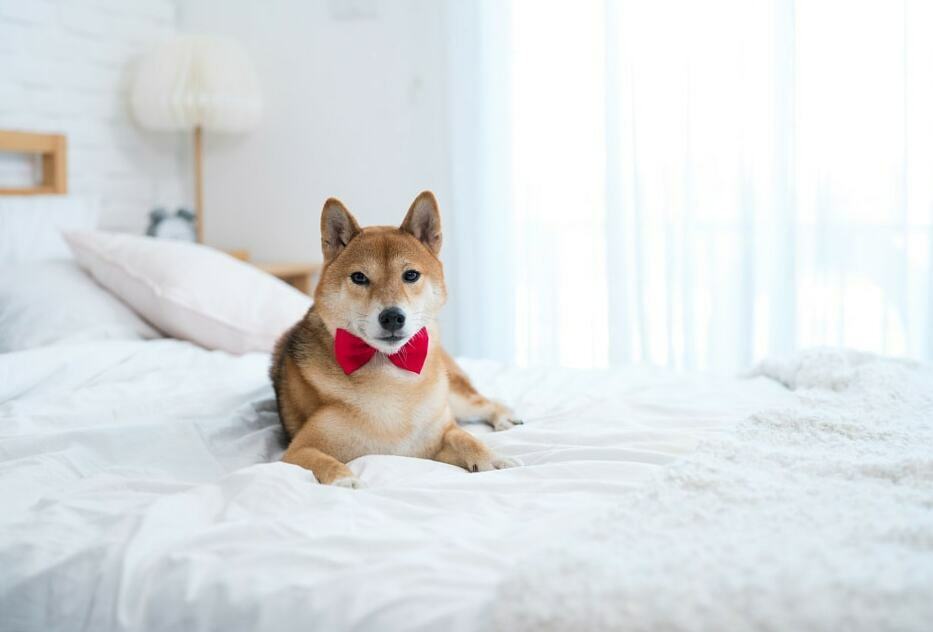Out of nowhere, your housetrained dog has started peeing your bed and other awkward locations around the home, and this has left you wondering why pooch has suddenly developed this habit. Well, this isn’t normal behavior, and it is certainly worth investigating why your dog is peeing on your bed.
Your dog may be peeing on your bed due to stress, as a response to fear or as a means of marking territory. Similarly, your dog peeing in awkward locations around the home may be due to an underlying medical condition or a side effect of using certain medication.
Coming home to meet a bed soaked in dog urine, after a long day at work, can be an extremely frustrating situation to deal with, which is why this behavior must be nipped in the bud, as soon as possible. Tips to clean a mattress stained with dog urine are outlined below, but before we go further, let’s see why exactly your dog has been peeing on your bed in front of you, in a bid to put an effective stop to this behavior.
Why Does My Dog Pee On My Bed In Front Of Me?
Your dog may be peeing on your bed, in your presence, as a result of stress or due to overexcitement from seeing you. In addition, dogs may pee on your bed in front of you as an attempt to mark its territory.
Stress
Dogs react to stress in various ways, and one commonly observed reaction among stressed dogs is unintentional urine dribbling.
That said, situations that may induce stress in your dog, and cause it to pee on your bed include relocation to a new, unfamiliar environment, introduction of a new pet into your home, being in the presence of a stranger, loud noises, and many more.
If your dog is stressed, it may be too afraid to return to its normal urinating spot, thereby causing it to pee on the nearest available location, which, unfortunately, may turn out to be your bed.
In addition, moving to a new location may lead to confusion in a dog about where to pee, and this typically results in a higher number of bathroom accidents.
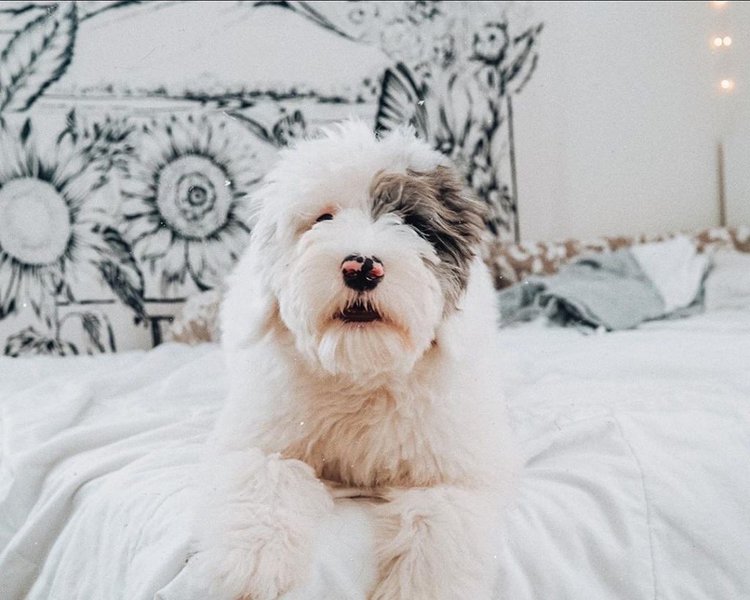
Excitement
Your dog may also be peeing on your bed, in front of you, simply because it is excited to see you, probably after you’ve been away at work for the majority of the day or when it’s time to go for a walk.
Excitement-based urination is common among younger dogs, but the good news is, dogs tend to get over this phase as they grow older and become more mature.
Also, this may sound weird, but your dog peeing on your bed in front of you may be the pooch’s way of showing its respect for you.
Territory Marking
Dogs are territorial by nature, and will often mark locations and objects with urine to show that such things belong to them, and to ward off intruders.
Consequently, a dog marking your bed with urine may be the pooch’s attempt to establish ownership of the bed, and the earlier this behavior is corrected, the better.
Why Won’t My Dog Stop Peeing On My Bed?
Possible reasons your dog won’t stop peeing on your bed include poor housetraining, the existence of an underlying medical issue, incontinence due to old age, and sexual tension.
Inadequate Housetraining
If your dog, especially when it is still a puppy, won’t stop peeing on your bed, then it may be because the pooch hasn’t been properly housebroken, taught the appropriate toilet behavior and shown the right peeing locations.
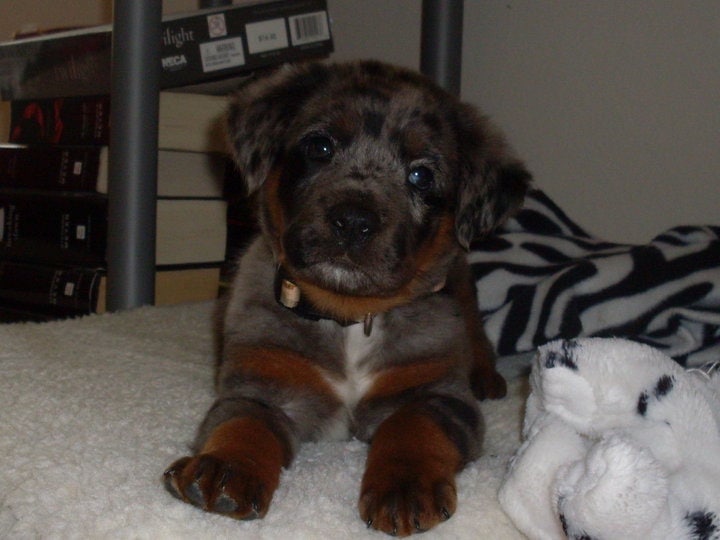
Medical Issues
Peeing on your bed can also be a sign that your pooch is suffering from any of the numerous urinary problems which typically make it difficult for dogs to control bladder activity.
Urinary Tract Infections (UTIs) are one of the most common causes of bathroom accidents among dogs, but the list of causes also includes cystitis, bladder stones, kidney diseases and tumors.
And apart from constantly peeing on your bed, symptoms commonly observed in a dog that’s suffering from a Urinary Tract Infection also include excessive urination, bloody urine, constant licking of the excretory organs, straining to urinate, and many more.
Incontinence
A dog’s body muscle typically weakens as the pooch ages. And if you have a senior dog that keeps peeing on your bed, such a pooch may have partially or completely lost control of its bladder muscles.
Sexual Behavior
Dogs communicate with their urine, and a female dog in heat may spray your bed with urine in its search for potential mating partners. Urine spraying due to heat may happen in any situation, but it is particularly prominent in households with multiple dogs.
How Do You Clean A Mattress With Dog Pee On It?
You can clean a mattress with dog pee on it with either a mixture of vinegar and baking soda, diluted hydrogen peroxide or special enzymatic cleaners.
Vinegar And Baking Soda
One of the most effective solutions for cleaning a mattress with dog pee on it, is baking soda mixed with vinegar in equal parts. Dog urine contains both alkaline and acidic compounds, and this vinegar-baking soda solution works well to neutralize these elements, and get rid of pee smell completely.
To prepare a vinegar-baking soda solution for cleaning a pee-stained mattress:
- Mix equal parts of vinegar and baking soda, and transfer the resulting solution into a spray bottle.
- Spray the solution directly on the affected area of the mattress, and allow the mattress to air-dry.
- Continue spraying and air-drying the mattress till the odor is completely eliminated.
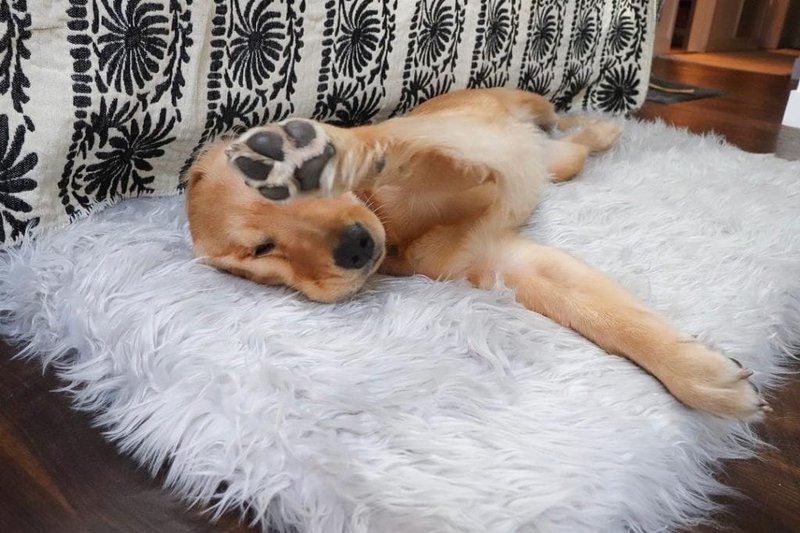
Hydrogen Peroxide
Another equally good remedy for combating the smell of dog urine on your furniture is a mixture of hydrogen peroxide that has been properly diluted with twice as much water.
Dampen the urine-stained area with the diluted hydrogen peroxide mixture, and leave the mattress out to dry. And for effective results, this process should be repeated till the smell of dog pee becomes non-existent.
Enzymatic Cleaners
One of, if not the most effective ways of cleaning a mattress with dog pee on it, and also eliminating any unwanted odor is by the use of special enzymatic cleaners.
Enzymatic cleaners are particularly effective at getting rid of unwanted smells from dog urine because they directly attack and break down components of the pee that are responsible for the offensive odor.
Timing Is Essential
Leaving dog pee unattended will lead to the urine becoming deeply seated within your bed’s fabric, and the smell will become considerably more difficult to remove.
Hence, this is why it is important to swing into action and clean up immediately once you notice that your dog has peed on your bed or any other piece of furniture, for that matter.
How Can I Get My Dog To Stop Peeing On My Bed?
You can get your dog to stop peeing on your bed by treating any underlying medical condition, eliminating stress and anxiety, properly cleaning up previous accidents, and restricting the pooch’s access to your bed.
Contact Your Vet
The first thing to do when you notice irregularities in your dog’s peeing behavior is to have your vet examine the pooch and rule out any possible underlying medical issue(s).
Medical conditions, such as UTIs and diabetes, are typically responsible for irregular peeing behavior in dogs, and prompt medical attention is required to ensure these conditions don’t degenerate into something serious.
Treatment methods for medical conditions that cause dogs to pee on beds vary, and they depend majorly on the underlying issue. Usually, some conditions can be treated with the use of antibiotics, while in more serious cases, surgery may be needed to ensure a pooch’s safety.
Restrict Your Dog’s Access To Your Bed
Once the issue of your dog peeing on your bed has been determined to be behavioral, the next step to take to curb this unwanted behavior is to minimize, and if possible, completely restrict the pooch’s access to your bed.
If you enjoy having your pooch sleep on the same bed with you, this step can be a temporary fix till you identify and correct whatever is responsible for the dog’s abnormal peeing behavior.
Identify And Eliminate Stress Triggers
As stated earlier, peeing on your bed may be your dog’s natural response to stress; Hence, to stop your dog from marking your bed with urine, you should identify what is most likely causing the pooch to be worried, and then work on ways to reassure and comfort the dog.
Avoid leaving your pooch alone at home, or unattended to, for long periods, as separation anxiety is one of the major causes of inappropriate urinary behavior.
Also, as a means of dealing with stress in dogs, you should consult your vet to prescribe anti-anxiety meds and supplements for the affected pooch.
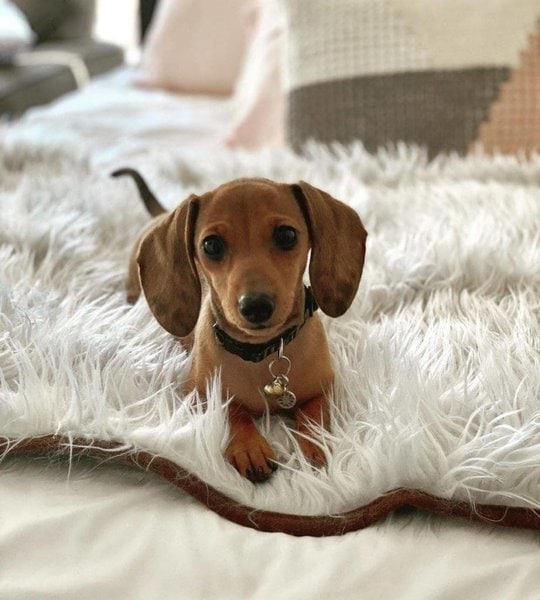
Proper Training
Even if you’ve previously potty trained your pooch, retraining the dog to use the toilet correctly, in different contexts, shall go a long way in reducing the occurrence of bathroom accidents.
Consider rewarding your dog for peeing in the correct locations with treats and praise. And if you catch your pooch in the process of peeing on your bed, ensure to calmly interrupt the dog, and then proceed to show such a pooch to the designated bathroom spot.
In addition, if you’ve recently relocated to a new house, then it’s imperative that you select, and introduce your pooch to its new peeing spot, as soon as possible. You should also ensure to give your dog enough potty breaks throughout the day, and be more attentive to the pooch’s requests to go use the toilet.
That said, training older dogs to stop peeing on your bed can be particularly tedious and frustrating. And if you aren’t noticing any visible signs of progress, then it is recommended that you get help from a professional dog trainer or animal behaviorist.
Ensure To Thoroughly Clean Inappropriate Locations That Your Dog Has Peed On
Dogs have a sharp sense of smell, and will locate, by smelling, and reuse locations that they have subsequently urinated on. Consequently, failure to thoroughly clean your bed or any other inappropriate location that your pooch is fond of peeing on, will only serve as encouragement for the doggie to revisit and use those locations again.
However, by cleaning your bed or any other inappropriate peeing location, using any of the cleaning methods outlined earlier, you’ll be masking and eliminating the scent of your pooch’s urine, thereby discouraging the dog from going back to pee in those spots.

